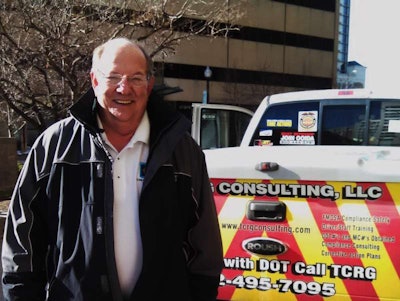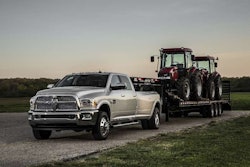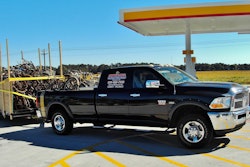From TCRG Consulting‘s Richard Wilson, below, this note he sent in the wake of news of FMCSA’s “imminent hazard” shutdown of an owner-operator after a fatal crash investigation uncovered a variety of issues. Read that original brief — and take particular note of Truckingops commentary in the section at bottom — via the link, but also take Wilson’s thoughts into consideration. Among former owner-operator Wilson’s compliance-consultancy clientele over the years have been many operations that fall into the 10,000-26000-lb. regulatory space that the shut-down operator apparently did as well, running a straight box truck.
 Delaware-based Richard Wilson. Find him via the website of his independent TCRG Consulting business.
Delaware-based Richard Wilson. Find him via the website of his independent TCRG Consulting business.I probably see this a little different than most. The key question here is, was the operator an “imminent hazard to the general public?” Yes he was. He was apparently ignoring several regulations because he probably didn’t feel his “box truck” was a big truck, so he didn’t have to comply! There are many smaller delivery companies out there that don’t believe they are big enough to be regulated. I deal with this everyday.
Still, bottom line, here we have a serious fatal accident involving innocent people. In the qualification process you show these types just what is compliance, but also teach them the same rules everyone has to follow. I’m sorry that someone has to die for this person, in other words this company, to get caught! It would have been much better if they would have been stopped or shut down on a scale or with portables before this incident — not during a post-crash investigation.
Our highways are filled with these so-called “small box truck” types that try to stay under the radar. There are as many illegal, noncompliant small trucking operations that we need to get off the highways. I’m not talking owner-operators as we in this room understand them to be. But — and a big but — there are rules and those rules start at 10,001 lbs., not 26,001. And to be compliant is to have awareness of the rules. Hundreds of thousands of DOT-regulated companies have to comply. This individual should have as well! So, should they have been shut down? Yes. Should they be placed out of service and a cease-and-desist order issued? Yes.
Some actions are harsh but necessary to protect those on the road, and those doing all the dumb stuff to be compliant! –Richard Wilson
Shortly after Wilson’s note came in, an Oklahoma-based owner-operator who’d bought a straight flatbed truck for regional interstate runs — tagged at 23,500 lbs. — wrote in about just what all he’d need in terms of paperwork to get straight and narrow with DOT (yes, there are many such operators attempting to do things right). Such a driver doesn’t need a CDL, nor to do IFTA, but pretty well everything else — logs, DOT authority, insurance, medical card, annual DOT inspection papers and the like.
One gray area that remained was in the need to do random drug and alcohol testing via a consortium like other owner-operators. The regs don’t require it of non-CDL drivers, and not knowing more about the particular operator’s CDL or non-CDL status — whether he had one or not — I asked Wilson what he thought about the situation, which could have import for some hotshot haulers looking to maintain and protect their CDL to haul larger freight time to time. Here’s what Wilson laid out:
If the driver has a CDL and has the opportunity to operate a 26,001+ lb. truck …
Yes, join a random-testing consortium.
If the driver is operating a truck under 26,000 and is not going to operate one any heavier but wants to keep his CDL …
Yes, join a random testing consortium. (Not “due to the equipment operated but to validate his CDL,” Wilson says. If the driver wishes to avoid the consortium, Wilson added, he should “turn in his CDL” to exempt himself from the requirements of 49 CFR Part 382.”)
If the driver doesn’t have a CDL …
No need to join a consortium.
Sharing it all with the owner-operator who wrote in, he was appreciative, but also echoed many other commenters on what all’s required:
It is very pleasing to see old school people still out there with professional attitudes and replies. Take care, I appreciate you reply, and am somewhat breathless at the amount of requirements for a simple hauling job that a man tries to make money with. It ends up costing so much to get started. It’s kind of like he is a crook from the start, but as long as he pays his gangster fees they let him operate. …
Oh, a-and he added one more thing. “Lol,” of course. Right back at you, Mr. Short, and good luck to you.










